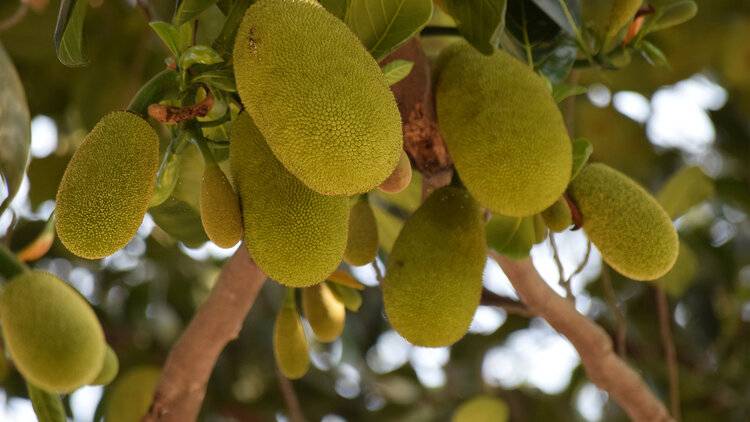Algemeen
Plant-based Meat Alternatives: Jackfruit
Jackfruit has become one of the world’s most popular meat alternatives, because of its distinctive, meat-like, sinewy texture. From a waste food in south and southeast Asia, it is suddenly crowding grocery stores and popping up on menus around the world. Today we’re taking a closer look at this fascinating fruit.
Jackfruit is native to South Asia and grows readily in tropical climates. It is a relative of fig and breadfruit trees. Jackfruit is an important food source in India, Bangladesh, Thailand, and Indonesia. Jackfruits are the largest tree-borne fruit in the world, averaging 5 - 10 kg, but weighing up to 45 kilograms and producing fruits a meter long. A single jackfruit tree can produce up to 3 tonnes of food per year.
The ripe fruit has a sweet flavor, similar to mango or banana. The unripe fruit has a mild, neutral flavor more like a potato. The edible seeds have a flesh similar to chestnut, and can be roasted as a snack. Because the young fruits are low on flavor, and have a fibrous, stringy texture that resembles meat, young jackfruit has become a popular meat alternative. When cooked, it readily absorbs the flavors of other ingredients, and can be the foundation for dishes that resemble pulled pork or shredded chicken.
Jackfruit Nutritional Value
Jackfruit is an excellent source of fibre, and is high in many essential vitamins. A 100 gram serving of uncooked jackfruit contains:
-
Kcal: 95
-
Carbohydrates: 23.25 g
-
Sugars: 19.08 g
-
Dietary fibre: 1.5 g
-
Fat: 0.64 g
-
Protein: 1.72 g
-
Thiamine: 9% RDA
-
Riboflavin: 5% RDA
-
Niacin: 5% RDA
-
Pantothenic Acid: 5% RDA
-
Vitamin B6: 25% RDA
-
Folate: 6% RDA
-
Vitamin C: 17% RDA
-
Magnesium: 8% RDA
-
Potassium: 10% RDA
-
(other nutrients at 2% or less)
Because it is easy to grow and each tree is so productive, jackfruit plays an important role in the diet and nutrition of the countries where it is grown. Many are considering it as a food crop that may help alleviate hunger in other suitable tropical regions of the world. However, just because a food is plant-based doesn’t mean it’s an environmentally conscious food.
Common Concerns About Jackfruit
As we begin to explore the huge benefits, uses, and potential of jackfruit, there are a few things we should keep in mind:
-
It’s an invasive species. In the mid-nineteenth century, Jackfruit trees were imported into Brazil and planted in the Tijuca Forest National Park. A single jackfruit tree produces about 200 fruits a year, and each fruit contains 100 - 500 seeds. In Brazil, small mammals such as the marmoset and coati eagerly eat the fruit and spread the seeds. This has allowed the trees to proliferate and displace native tree species. In addition, the new food source has caused an increase in the population of small rodents, who prey on local bird species. So introduction of the jackfruit into new regions should be done with extreme care and monitoring for impact on local ecosystems and wildlife.
-
It has a huge carbon footprint. Jackfruit is native to south and southeast Asia, but it is being exported in growing numbers to serve the vegetarian and vegan food markets in Europe and North America. It’s important to remember that shipping a product halfway around the world comes with a huge carbon cost.
Jackfruit vs. the Oyster Mushroom
At BeefyGreen, we believe the oyster mushroom is a near-perfect meat alternative. Unlike the jackfruit, oyster mushrooms can be seamlessly blended into ground, minced, and chopped meats to reduce meat content in a meal, without impacting texture or flavour. Used alone, oyster mushrooms have a satisfying texture and flavour that doesn’t need to be disguised like jackfruit. And oyster mushrooms have ⅓ the calories and 300% more protein per serving than jackfruit. All that nutrition in a food that can be grown anywhere, with little water, cultivation, carbon cost, or environmental impact.
We support everyone who is looking for ways to eat healthier, reduce their environmental impact, and make responsible food choices. And there’s no doubt that many of the jackfruit recipes that proliferate online are delicious. But jackfruit may not be the solution to the world’s hunger problems, and may not be the best long-term meat alternative for consumers in Europe and North America.
